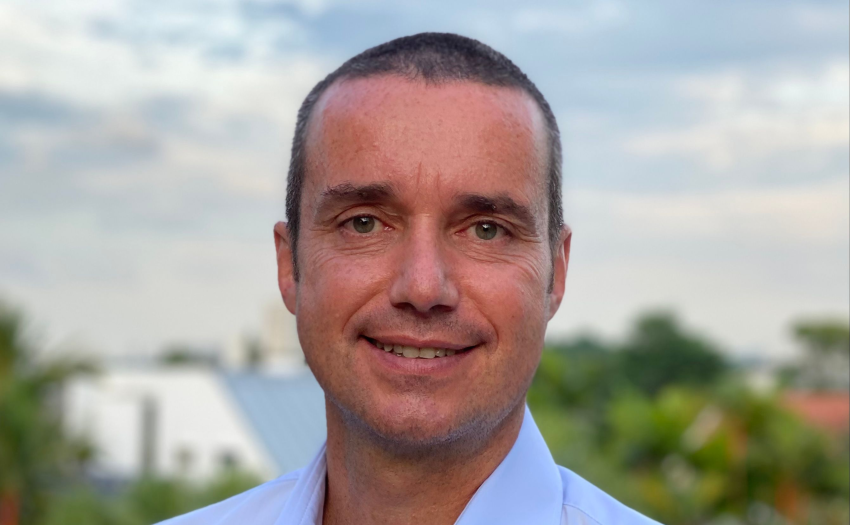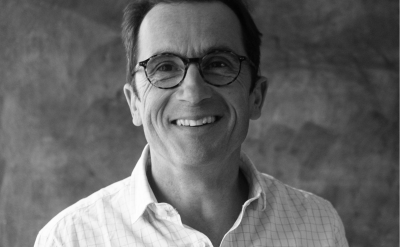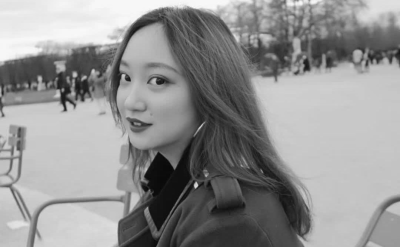News

Gildas Coldeboeuf (SK 1993), founder of Artasi, expanding remote work capabilities with augmented reality
Augmented reality is a new technology that is currently gaining ground with private individuals and companies alike. Gildas Coldeboeuf (SK 1993), founder of Artasi, has taken on the challenge. He answers our questions about his personal and entrepreneurial adventures since graduating from SKEMA.
What were the key stages in your journey that led you to take the leap into entrepreneurship?
After attending a preparatory class in Pau, I enrolled at SKEMA in 1990. At the time it was called Sup de Co Lille. After graduating, I volunteered to do my French national service as a trainee in a corporate environment as part of the VSNE programme, somewhat like the VIE (volunteer for international experience) programme these days. I worked in Gabon for the CFAO group, an import-export company in the automotive sector. Like many young graduates who go off to work abroad, I quickly found myself with a lot of responsibilities (managing staff, stock, the communication strategy, sales...). At 23, fresh out of school, I was managing a team of a dozen people. I have pretty great memories of that time even though the political context was very complicated. After that adventure, I had a chat with a friend from SKEMA who worked for Canon, and what he told me made me want to join that company. Over the course of my 21 years with Canon, I got the chance to live in Paris, Amsterdam and London. I loved the experience and I still feel an emotional attachment to the brand. My wife was then offered a career opportunity in Asia. That is how my time with Canon came to an end and we moved to Singapore with our two children in 2016. In Asia, I worked as CEO for Manzalab, a company that creates innovative digital experiences for product presentations and training delivery among other things. I hadn’t really planned on starting my own company, but four years after arriving in Asia my desire to be in the thick of the action and create value prompted me to set myself a new challenge and that is how Artasi was born.
Can you tell us about Artasi?
I was informed of the need by a business school student during a conference where I was a guest speaker. The company he was working for was having a problem with a machine set up in China. The machine had broken down and all the experts or engineers were in Europe and unable to travel because of the COVID-19 pandemic. I then got the idea to offer him an ecosystem that included an augmented reality headset and the technology to communicate, so the expert in Europe could be directly in touch with the operator in Asia tasked with repairing the machine. That is how the Artasi project came about. Using augmented reality, our goal is to help companies improve their productivity and efficiency in three areas: training, auditing, and machine maintenance. All remotely. In the current context, with travel being impossible, companies cutting their budgets and some wanting to reduce their carbon footprint, this innovative tool is ideal as it provides global companies with a new way to collaborate and to work remotely.
How does an augmented reality (AR) headset work?
It’s very simple: the operator wearing the headset continues to see their real environment with the defective machine in front of them. As for the expert, they can see everything the operator sees, from wherever they happen to be in the world. This expert can talk to the operator and transmit information to them which will be visible directly on the headset lenses. This additional virtual information is effectively superimposed on the real environment. This way, the expert can transmit all their instructions, indicate the source of the problem and tell the operator what to do to fix the machine.
How can companies use augmented reality today?
For one, augmented reality is very useful for remote maintenance operations. As an example, it allows an operator lacking the knowledge needed to fix a machine to be in real-time contact with an expert thousands of miles away who can guide them through the procedure. But augmented reality can also be used for delivering training or even for conducting an audit. At Artasi, we have built an ecosystem with an AR headset or glasses, a platform for coordinating all the headset users within a same company, the service to support the client, and Artasi technology to allow the relevant parties to communicate. This comprehensive ecosystem enables all employees to communicate with each other and can put an expert in contact with an operator, an auditor with an auditee, a trainer with a trainee... and all of this remotely, saving a great deal of time.
What are Artasi’s key strengths?
Today we provide a solution to a very current problem and need: connecting teams, auditing them, training them. Our partner Lenovo, a global leader in the IT world, our competent and flexible teams, and our customizable offering make us a solid player in the new technologies sector. Based in Singapore, we are planning a global deployment, because our teams and clients have no borders.
What sort of connection have you maintained with the school?
I am a SKEMA ambassador for the Singapore alumni community (about 100 members) and the French Grandes Écoles, a group of 18 French “grandes écoles” (business schools, engineering schools and top universities). Several times a year we organise events to bring the alumni together, focusing on different career- or environment-related themes. This year we invited guest speaker Franck Seguin, editor-in-chief in charge of the photo production department at French sports magazine L’Équipe. We also host networking events around national holidays like Bastille Day, for example, or pétanque tournaments. I agreed to be an ambassador because I felt it was important to give of my time, and to share my network and experience with the alumni. It also allows us to help alumni who are in a precarious professional situation right now because of the current crisis, to show solidarity, support and empathy. Over the years I have noticed the school’s incredible evolution and its establishment all around the world, in Asia, South America, Africa, the United States. Since I’ve also lived and worked in different countries, I appreciate this openness to the world, to different cultures and ways of working. I find this evolution and all the work done over the last few years in terms of internationalization, but also in terms of quality of education, absolutely fantastic and this is what has forged the reputation SKEMA enjoys today.
Contact: Gildas Coldeboeuf (SK 1993), founder of Artasi - email (gildas.coldeboeuf@artasi.com)
Interview by lepetitjournal.com for SKEMA Alumni




